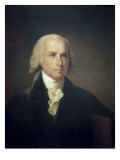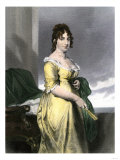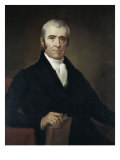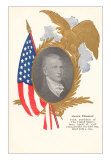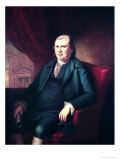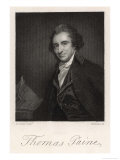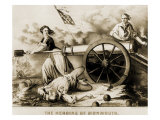|
|
|
|
|
|
|
|
|
|
|
|
|
|
|
|
|
BOOKS ABOUT
THE AMERICAN REVOLUTION
|
|
|
|
|
|
|
|
|
|
|
|
|
|
|
|
 |
|
|
|
|
|
|
|
|
|
Francis Marion
b. 2-26-1732; Georgetown, SC
d. 2-27-1795
Francis Marion, known as the “Swamp Fox”, and working with the South Carolina militia and the Continental Army, was a persistent adversary of the British in their occupation of South Carolina in 1780 and 1781. His irregular methods of warfare makes him one of the fathers of modern guerrilla warfare, and he considered one the precursors to the United States Army Rangers.
• Francis Marion at Amazon
|
|
|
|
|
|
|
George Mason
b. 12-11-1725; Fairfax County, Colony of Virginia
d. 11-7-1792; Virginia
George Mason was a Virginia delegate to the US Constitutional Convention and along with James Madison considered a “Father of the Bill of Rights.”
Mason, an anti-federalist, advocated a weak central government divided into three parts (executive, legislative and judicial), with political power remaining with the states, as well as the disestablishment of the church.
|
|
|
|
Daniel Morgan
b. c. 1736; Junction, Hunterdon Co., New Jersey
d. 7-6-1802; Winchester, VA
Daniel Morgan formed one of two Virginia rifle companies that marched to Boston and participated in the seige. His company was known as “Morgan's Sharpshooters”.
Morgan commanded three companies chosen to take part in Benedict Arnold's Expedition in the Invasion of Canada. Morgan was captured at Quebec and returned to Continental Army in a prisoner exchange.
• Daniel Morgan at Amazon
|
|
|
|
James Monroe (D-R)
(5th US President, 1817-25)
b. 4-28-1758; Westmoreland Co., Colony of Virginia
d. 7-4-1831; NY, NY
James Monroe, the last Founding Father to become president, was wounded in the shoulder in the Battle of Trenton. According to Wikipedia Monroe is portraited as the man holding the flag in the famous painting Washington Crossing the Delaware.
|
|
|
|
|
|
|
Robert Morris
b. 1-31-1734; Liverpool, England
d. 5-8-1806; Philadelphia
Robert Morris, known as the “Financier of the American Revolution” started life in the colonies as an apprentice in a counting house. By the time of the Revolution he was a rich man, a commercial and social leader in Philadelphia.
Morris organized a clandestine trading network to arm the American rebels, joined the Second Continental Congress, and with Benjamin Franklin, Alexander Hamilton, James Madison, and Washington, ran the executive branches of the revolutionary government for years. Morris' business acumen financed two crucial victories — Valley Forge and the culminating battle at Yorktown that defeated Cornwallis and ended the war.
• Robert Morris: Financier of the American Revolution
• more Declaration of Independence signers
|
|
|
|
Thomas Paine
b. 1-29-1737; Thetford, Norfolk, England
d. 6-8-1809; NYC
Thomas Paine, considered a Founding Father, was a radical political writer and freethinker.
Thomas Paine was indicted on charges of treason (in Britain) with his essay, The Rights of Man , supporting independence of the colonists in North America and attacking Christianity as a “pious fraud,“ calling it “repugnant to reason.” In Paine's The Age of Reason , supporting independence of the colonists in North America and attacking Christianity as a “pious fraud,“ calling it “repugnant to reason.” In Paine's The Age of Reason , which was easily available, clergy in America and Britain criticized his work as dangerous to the souls of the uneducated. , which was easily available, clergy in America and Britain criticized his work as dangerous to the souls of the uneducated.
FYI - Paine, who promoted Deism - a religious expression of scientific rationalism - was acquainted with William Blake the English mystic, artist and poet.
Thomas Paine quotes ~
• “The cause of America is in a great measure the cause of all mankind.”
• “Society in every state is a blessing, but government even in its best state is but a necessary evil; in its worst state an intolerable one; for when we suffer, or are exposed to the same miseries BY A GOVERNMENT, which we might expect in a country WITHOUT GOVERNMENT, our calamity is heightened by reflecting that we furnish the means by which we suffer.”
• “There is something exceedingly ridiculous in the composition of monarchy; it first excludes a man from the means of information, yet empowers him to act in cases where the highest judgment is required.”
• “THESE are the times that try men's souls. The summer soldier and the sunshine patriot will, in this crisis, shrink from the service of their country; but he that stands it now, deserves the love and thanks of man and woman. Tyranny, like hell, is not easily conquered; yet we have this consolation with us, that the harder the conflict, the more glorious the triumph. What we obtain too cheap, we esteem too lightly: it is dearness only that gives every thing its value. Heaven knows how to put a proper price upon its goods; and it would be strange indeed if so celestial an article as FREEDOM should not be highly rated.”
• “It matters not where you live, or what rank of life you hold, the evil or the blessing will reach you all. The far and the near, the home counties and the back, the rich and the poor, will suffer or rejoice alike. The heart that feels not now is dead; the blood of his children will curse his cowardice, who shrinks back at a time when a little might have saved the whole, and made them happy. I love the man that can smile in trouble, that can gather strength from distress, and grow brave by reflection. 'Tis the business of little minds to shrink; but he whose heart is firm, and whose conscience approves his conduct, will pursue his principles unto death.”
|
|
|
|
Molly Pitcher, a nickname given to a woman who may have fought in the American Revolutionary War, and may or may not refer to Mary Ludwig Hays McCauley (b. c. 1754 - 1832), wife of Revolutionary War soldier William Hays.
The name Molly Pitcher is based on actions of real women who carried water to men on the battlefield during the war. This water was not for drinking, as is popularly believed, but for swabbing the cannons.
|
|
|
|
Kazimierz Pulaski
b. 3-4-1745; Warsaw, Poland
d. 10-11-1779; Georgia
Kazimierz Pulaski, a Polish nobelman and cavalry soldier of fortune, was recruited by Lafayette and recommended to Washington by Benjamin Franklin. Pulaski saved the life of Washington in the Battle of Brandywine, and died of wounds incurred during the Battle of Savannah. Pulaski is known as the “father of American cavalry”.
FYI ~ several places in the US are named after Pulaski - towns in Tennessee, Iowa, Wisconsin, & New York; counties in Arkansas, Georgia, Illinois, Indiana, Kentucky, Missouri, and Virginia.
|
|
|
|
Israel Putnam
b. 1-7-1718; Danvers, MA
d. 5-29-1790; Brooklyn, CT
At the beginning of the Revolutionary War Israel Putnam was a well to do farmer and inn keeper who had been a member of Roger's Rangers.
|
|
|
previous page | top
American Revolution Posters 1 | 2 | 3 | 4 | 5 | 6 | 7 | next
|
|
I have searched the web for visual, text, and manipulative curriculum support materials - teaching posters, art prints, maps, charts, calendars, books and educational toys featuring famous people, places and events - to help teachers optimize their valuable time and budget.
Browsing the subject areas at NetPosterWorks.com is a learning experience where educators can plan context rich environments while comparing prices, special discounts, framing options and shipping from educational resources.
Thank you for starting your search for inspirational, motivational, and educational posters and learning materials at NetPosterWorks.com. If you need help please contact us.
|
|
|













